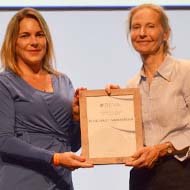
The live awards ceremony celebrated excellence in the profession.
On Monday 6 September, the British Equine Veterinary Association (BEVA) held a live awards ceremony at the BEVA Congress event.
Three veterinary professionals were honoured with awards at a ceremony in the main auditorium of the event, for brilliance within the equine veterinary profession.
The awards were as follows;
The BEVA Equine Welfare Award, sponsored by the Blue Cross
This award was presented to Lode E A De Smet MRCVS for his dedication to improving equine welfare. Lode has been a partner at Llanelli's Gibson and Jones veterinary surgeons for 20 years, and takes on the RSPCA equine welfare work in South Wales.
Having dealt with over 500 cases, Lode not only cares for each one, but also willingly takes them home to provide further rehabilitation if they are unfit to travel.
Lode's colleagues have said that his case work is often long, hard, cold and stressful, but he never complains, and consider him an incredibly deserving recipient of the award.
The BEVA Richard Hartley Clinical Award
Gemma Pearson was awarded the BEVA Richard Hartley Clinical Award for the paper 'Difficult horses - prevalence, approaches to management of and understanding of how they develop by equine veterinarians', first published in EVE in July 2020.
The Peter Rossdale Equine Veterinary Journal (ECJ) Open Award
This award was presented to Amie Wilson for the paper 'Equine influenza vaccination in the UK: Current practices may leave horses with suboptimal immunity', first published in EVJ in October 2020.
Sam Hignett Award
All Clinical Research presentations from general equine practice are considered eligible for the Sam Hignett Award. Throughout the Clinical Research Sessions at Congress, there will be a continuous assessment process to decide the winner of this award, who will be announced after Congress on the BEVA website and newsletter.
More information on the BEVA awards can be accessed here.



 The RCVS has announced a new version of its 1CPD mobile app, with enhanced features for veterinary surgeons and veterinary nurses to record their continuing professional development.
The RCVS has announced a new version of its 1CPD mobile app, with enhanced features for veterinary surgeons and veterinary nurses to record their continuing professional development.